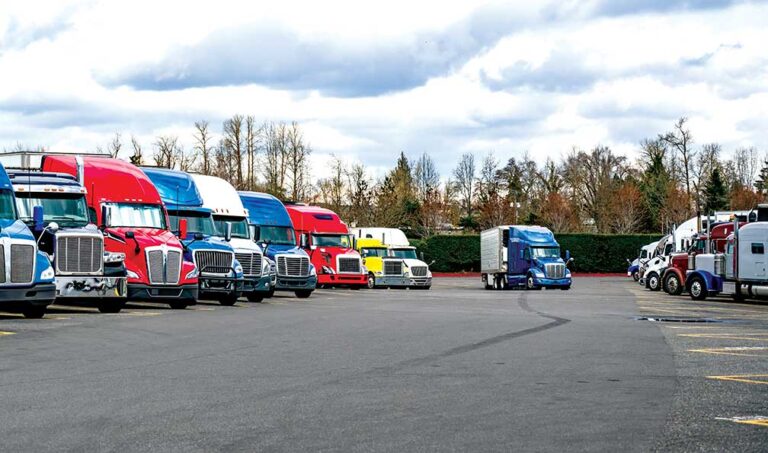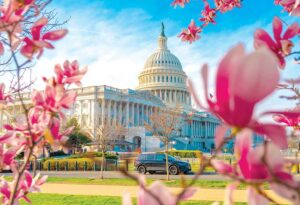in late June, Congressional leaders announced that $200 million of the House Transportation Appropriations Subcommittee funding bill will be earmarked for truck parking. On July 12, the bill, HR 9028, was placed on the House calendar.
This bill directs the Department of Transportation (USDOT) to provide competitive grants for projects that provide public parking for commercial motor vehicles and improve the safety of commercial motor vehicle drivers.
States, metropolitan planning organizations, tribal governments and local governments are all eligible for these grants, which “must be used for projects on federal-aid highways or a facility with reasonable access to such a highway or a freight facility,” according to the bill.
In providing grants, the USDOT must determine the following criteria:
- That there is a shortage of commercial motor vehicle parking capacity in the corridor in which the project is located;
- That the eligible entity has consulted with motor carriers, commercial motor vehicle drivers, public safety officials, and private providers of commercial motor vehicle parking regarding the project;
- That the project will likely increase the availability or utilization of commercial motor vehicle parking, facilitate the efficient movement of freight or improve highway safety, traffic congestion, and air quality; and
- That the eligible entity has demonstrated the ability to provide for the maintenance and operation of the facility.
In addition to the $200 million for truck parking, the House funding bill addresses a number of other trucking industry priorities, such as strengthening the Safe Driver Apprenticeship Pilot Program and blocking a waiver requested by California that would create a patchwork of meal and rest break rules, something many believe would undermine safety and the supply chain.
The bill would also prevent the Federal Highway Administration from moving forward with its proposal to impose greenhouse gas emissions performance measures on state departments of transportation and metropolitan planning organizations.
Additionally, the bill would prohibit the implementation of any congestion tolling programs, such as the one planned by New York City that has now been indefinitely suspended.
A lack of safe parking has been near the top of industry issues for decades.
According to a USDOT study, 98% of truck drivers regularly experience problems locating safe parking. An analysis by the American Transportation Research Institute found that the average driver sacrifices 56 minutes of drive time per day in search of a parking space, resulting in $6,813 in lost wages for drivers each year.
This new investment in truck parking would build on the progress that has been made through the Bipartisan Infrastructure Law that ATA championed, which has already allocated funding to build roughly 2,000 truck parking spaces.
Hailey Betham, manager for government affairs at the Truckload Carriers Association (TCA), says the group is closely watching the government’s progress on this issue.
Aside from the announced funding proposal in late June, the Truck Parking Safety Improvement Act is also working its way through the federal government.
If passed, the act would provide $755 million over three years to expand parking capacity.
“Currently, there are many variations of the truck parking bill,” she said. “We have The Truck Parking Safety Improvement Act (HR 2367 and S 034), which we hope to see more movement, as the Senate bill currently resides in the Senate Committee on Environment and Public Works, and we are actively trying to garner more co-sponsors to see more movement.”
Betham noted that the Senate’s version of the House Transportation Appropriations Subcommittee funding bill does not include this language, noting, “We hope we see the same funds allocated in future revisions of their funding bill.”
“If we see the $200 million towards truck parking projects in both FY25 THUD funding bills, this will be a victory for our industry as it is a step forward to seeing more movement for HR 2367 and S 1034,” she said.
The legislation has the potential to have a profound impact on the trucking industry.
“The need for truck parking is not just important, it’s urgent,” Betham said. “An increase in truck parking will not only prevent road accidents, but also provide safety for our nation’s drivers, especially our women drivers. Drivers will be protected in an area with accessible restrooms and lighting, free from fear even when they sleep through the night.”
Like TCA’s Betham, the American Trucking Associations’ president and CEO, Chris Spear, is cheering on the efforts in Washington to create more truck parking.
“The severe shortage of truck parking places an enormous burden on truck drivers, who often don’t know if they will be able to find a safe place to sleep when they finish their shift,” Spear said. “This significant investment to expand parking capacity would help alleviate stress on truck drivers, move freight more efficiently, and make the roadways safer for all motorists.”
Spear thanked the members of the House Transportation Appropriations Subcommittee “for prioritizing this funding that will benefit truck drivers and our supply chain, and we are especially appreciative of the decisive leadership of Congressman Womack for ensuring this provision was incorporated in the final bill.”
This story originally appeared in the September/October 2024 edition of Truckload Authority, the official magazine of the Truckload Carriers Association.
Born in Pine Bluff, Arkansas, and raised in East Texas, John Worthen returned to his home state to attend college in 1998 and decided to make his life in The Natural State. Worthen is a 20-year veteran of the journalism industry and has covered just about every topic there is. He has a passion for writing and telling stories. He has worked as a beat reporter and bureau chief for a statewide newspaper and as managing editor of a regional newspaper in Arkansas. Additionally, Worthen has been a prolific freelance journalist for two decades, and has been published in several travel magazines and on travel websites.









the big parking problems on all the citys. no place to park and shippers and reciving warehouses not probide place to park. and all the city streets fullof the no parking signs. where the drivers can park waiting for load and unload…….on the AIR